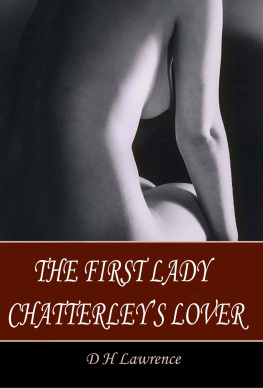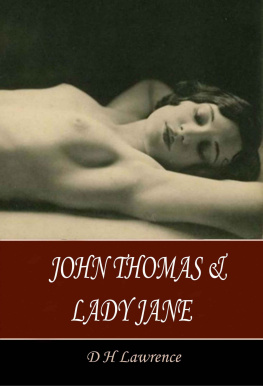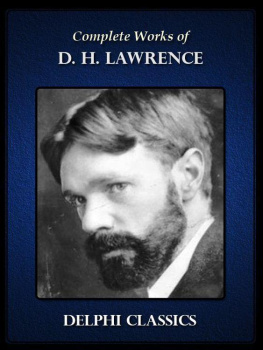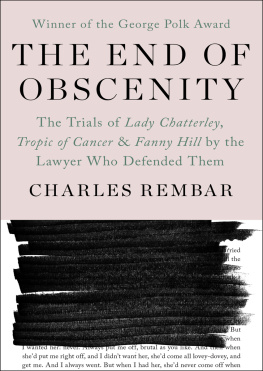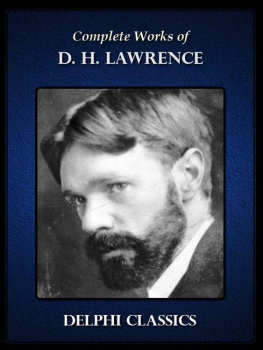Ours is essentially a tragic age, so we refuse to take it tragically. The cataclysm has happened, we are among the ruins, we start to build up new little habitats, to have new little hopes. It is rather hard work: there is now no smooth road into the future: but we go round, or scramble over the obstacles. We've got to live, no matter how many skies have fallen.
This was more or less Constance Chatterley's position. The war had brought the roof down over her head. And she had realized that one must live and learn.
She married Clifford Chatterley in 1917, when he was home for a month on leave. They had a month's honeymoon. Then he went back to Flanders: to be shipped over to England again six months later, more or less in bits. Constance, his wife, was then twenty-three years old, and he was twenty-nine.
His hold on life was marvellous. He didn't die, and the bits seemed to grow together again. For two years he remained in the doctor's hands. Then he was pronounced a cure, and could return to life again, with the lower half of his body, from the hips down, paralysed for ever.
This was in 1920. They returned, Clifford and Constance, to his home, Wragby Hall, the family 'seat'. His father had died, Clifford was now a baronet, Sir Clifford, and Constance was Lady Chatterley. They came to start housekeeping and married life in the rather forlorn home of the Chatterleys on a rather inadequate income. Clifford had a sister, but she had departed. Otherwise there were no near relatives. The elder brother was dead in the war. Crippled for ever, knowing he could never have any children, Clifford came home to the smoky Midlands to keep the Chatterley name alive while he could.
He was not really downcast. He could wheel himself about in a wheeled chair, and he had a bath-chair with a small motor attachment, so he could drive himself slowly round the garden and into the line melancholy park, of which he was really so proud, though he pretended to be flippant about it.
Having suffered so much, the capacity for suffering had to some extent left him. He remained strange and bright and cheerful, almost, one might say, chirpy, with his ruddy, healthy-looking face, and his pale-blue, challenging bright eyes. His shoulders were broad and strong, his hands were very strong. He was expensively dressed, and wore handsome neckties from Bond Street. Yet still in his face one saw the watchful look, the slight vacancy of a cripple.
He had so very nearly lost his life, that what remained was wonderfully precious to him. It was obvious in the anxious brightness of his eyes, how proud he was, after the great shock, of being alive. But he had been so much hurt that something inside him had perished, some of his feelings had gone. There was a blank of insentience.
Constance, his wife, was a ruddy, country-looking girl with soft brown hair and sturdy body, and slow movements, full of unusual energy. She had big, wondering eyes, and a soft mild voice, and seemed just to have come from her native village. It was not so at all. Her father was the once well-known R. A., old Sir Malcolm Reid. Her mother had been one of the cultivated Fabians in the palmy, rather pre-Raphaelite days. Between artists and cultured socialists, Constance and her sister Hilda had had what might be called an aesthetically unconventional upbringing. They had been taken to Paris and Florence and Rome to breathe in art, and they had been taken also in the other direction, to the Hague and Berlin, to great Socialist conventions, where the speakers spoke in every civilized tongue, and no one was abashed.
The two girls, therefore, were from an early age not the least daunted by either art or ideal politics. It was their natural atmosphere. They were at once cosmopolitan and provincial, with the cosmopolitan provincialism of art that goes with pure social ideals.
They had been sent to Dresden at the age of fifteen, for music among other things. And they had had a good time there. They lived freely among the students, they argued with the men over philosophical, sociological and artistic matters, they were just as good as the men themselves: only better, since they were women. And they tramped off to the forests with sturdy youths bearing guitars, twang-twang! They sang the Wandervogel songs, and they were free. Free! That was the great word. Out in the open world, out in the forests of the morning, with lusty and splendid-throated young fellows, free to do as they liked, andabove allto say what they liked. It was the talk that mattered supremely: the impassioned interchange of talk. Love was only a minor accompaniment.
Both Hilda and Constance had had their tentative love-affairs by the time they were eighteen. The young men with whom they talked so passionately and sang so lustily and camped under the trees in such freedom wanted, of course, the love connexion. The girls were doubtful, but then the thing was so much talked about, it was supposed to be so important. And the men were so humble and craving. Why couldn't a girl be queenly, and give the gift of herself?
So they had given the gift of themselves, each to the youth with whom she had the most subtle and intimate arguments. The arguments, the discussions were the great thing: the love-making and connexion were only a sort of primitive reversion and a bit of an anti-climax. One was less in love with the boy afterwards, and a little inclined to hate him, as if he had trespassed on one's privacy and inner freedom. For, of course, being a girl, one's whole dignity and meaning in life consisted in the achievement of an absolute, a perfect, a pure and noble freedom. What else did a girl's life mean? To shake off the old and sordid connexions and subjections.
And however one might sentimentalize it, this sex business was one of the most ancient, sordid connexions and subjections. Poets who glorified it were mostly men. Women had always known there was something better, something higher. And now they knew it more definitely than ever. The beautiful pure freedom of a woman was infinitely more wonderful than any sexual love. The only unfortunate thing was that men lagged so far behind women in the matter. They insisted on the sex thing like dogs.
And a woman had to yield. A man was like a child with his appetites. A woman had to yield him what he wanted, or like a child he would probably turn nasty and flounce away and spoil what was a very pleasant connexion. But a woman could yield to a man without yielding her inner, free self. That the poets and talkers about sex did not seem to have taken sufficiently into account. A woman could take a man without really giving herself away. Certainly she could take him without giving herself into his power. Rather she could use this sex thing to have power over him. For she only had to hold herself back in sexual intercourse, and let him finish and expend himself without herself coming to the crisis: and then she could prolong the connexion and achieve her orgasm and her crisis while he was merely her tool.
Both sisters had had their love experience by the time the war came, and they were hurried home. Neither was ever in love with a young man unless he and she were verbally very near: that is unless they were profoundly interested, talking to one another. The amazing, the profound, the unbelievable thrill there was in passionately talking to some really clever young man by the hour, resuming day after day for monthsthis they had never realized till it happened! The paradisal promise: Thou shalt have men to talk to!had never been uttered. It was fulfilled before they knew what a promise it was.
And if after the roused intimacy of these vivid and soul-enlightened discussions the sex thing became more or less inevitable, then let it. It marked the end of a chapter. It had a thrill of its own too: a queer vibrating thrill inside the body, a final spasm of self-assertion, like the last word, exciting, and very like the row of asterisks that can be put to show the end of a paragraph, and a break in the theme.



